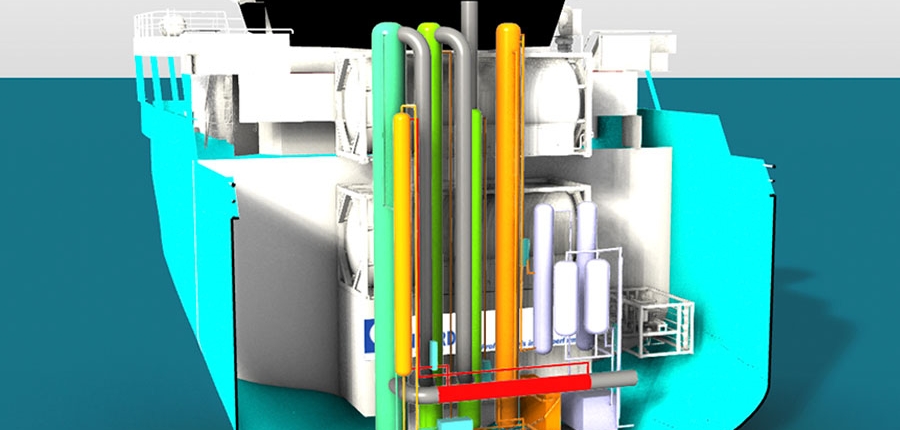International team nets €3.4M to advance ship-based carbon capture for maritime sector
We are happy to announce that we are participating in the EverLoNG project, led by TNO. The EverLoNG project will demonstrate Ship Based Carbon Capture on board two LNG-fuelled ships, owned and operated by project partners TotalEnergies and Heerema Marine Contractors. With its results the project aims to bring the technology closer to market readiness.
With the Intergovernmental Panel on Climate Change (IPCC) in its latest report stressing once again that we need ‘immediate and deep emissions reductions across all sectors’, we are proud to contribute as a partner to the ambitious EverLoNG project, enabling drastic reductions in CO2-emissions from ships.
Below you can read the full press release of this ambitious EverLoNG project.
International team nets €3.4M to advance ship-based carbon capture for maritime sector
EverLoNG to conduct technology trials on board two LNG-fuelled ships along with supporting studies
A cross-boundary project involving science and industry experts has landed €3.4 million (total budget €4.9M) from an EU climate action fund to accelerate the uptake of ship-based carbon capture (SBCC) by international shipping companies.
The EverLoNG project led by TNO will demonstrate SBCC on board two LNG-fuelled ships, owned and operated by project partners TotalEnergies and Heerema Marine Contractors, with results aimed at moving the technology closer to market readiness.
As well as the SBCC trials, the 16 project partners from five countries – Germany, the Netherlands, Norway, the UK and the USA – will conduct studies to support the development of full-chain carbon capture, utilisation and storage (CCUS) networks, connecting SBCC with CO2 transport links, geological CO2 storage and markets for CO2 use. These studies will identify and help solve any technical barriers to the implementation of SBCC as well as lower the costs associated with the technology.
The project consortium includes ship classification societies – Lloyd’s Register, Bureau Veritas and DNV – who will evaluate how SBCC fits within existing regulatory frameworks for shipping.
Combined activities by EverLoNG partners will support the ambitious target of advancing SBCC as a cost-competitive decarbonisation option on the market by 2025, with a marginal abatement cost – the cost of reducing environmental impact – of between €75 and €100 per tonne of CO2 equivalent and a CO2 capture rate of up to 90%.
EverLoNG has today launched a dedicated website – everlongccus.eu – with information about all aspects of the project and links to its social media channels.
EverLoNG project coordinator, Marco Linders of TNO, said: “Funding from the ACT3 programme will enable us to conduct studies aimed at making commercial ship-based carbon capture a reality. Our demonstration campaigns will optimise SBCC technology and we will also consider how best to integrate it into existing ship and port infrastructure. We’ll also carry out detailed life cycle assessments and techno-economic analysis, which will be essential information for maritime sector companies. International collaboration is a big part of EverLoNG and our consortium is fully committed to supporting the shipping industry’s decarbonisation goals.”
Heerema’s Sustainability Project Manager, Cees Dijkhuizen, said: “At Heerema, we believe that a responsible company is a sustainable company. This belief is why we became carbon neutral in 2020 and have committed to reducing our footprint by up to 80% by the end of 2026. Taking part in the EverLoNG Project and testing the use of a carbon capture and storage system on board our ship Sleipnir is an important step towards reaching our goals.”
Philip Llewellyn, Carbon Capture, Utilisation and Storage Program Manager, TotalEnergies, said: “TotalEnergies is pleased to be part of the EverLoNG project, which aims to demonstrate the feasibility of CO2 capture on board ships. As part of our climate ambition to achieve net zero emissions by 2050, together with society, the decarbonisation of our maritime activity is an important challenge. Ship-based carbon capture is a promising short-term solution as it could be installed on the current fleet of ships. In addition, the potential application of such a technology onboard future CO2 carriers, as in the Northern Lights project, in which TotalEnergies is a partner, could bring high-potential synergies.”
Following a rigorous two-stage evaluation process, EverLoNG was selected along with 12 other R&D projects by the ACT3 funders in 2021 in order to address key research and innovation targets in the CCUS field.
The maritime sector aims to reduce CO2 emissions from international shipping by at least 50% by 2050. SBCC is one option being considered as a low-cost, short-term approach to decarbonising the sector, compared to zero-emission fuels, such as ammonia and hydrogen.
Keep up-to-date with the EverLoNG project by visiting our website, following us on Twitter @everlongccus and LinkedIn and signing up to our mailing list here.



